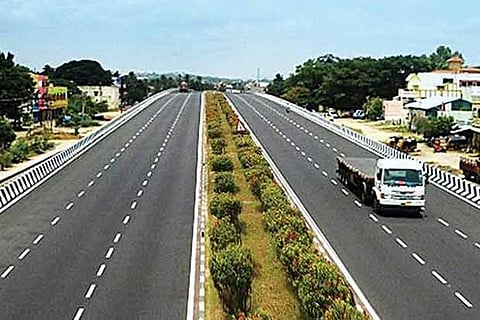

New Delhi
The Supreme Court on Tuesday said the Central government is fully competent to notify "any land" for acquisition, to construct a national highway and prior environmental clearance is not necessary at the stage of notification of land acquisition proceedings.
A bench comprising of Justices A. M. Khanwilkar, B. R. Gavai and Krishan Murari allowed the Centre go ahead with Rs 10,000 crore Chennai-Krishnagiri-Salem eight-lane expressway under the "Bharatmala Pariyojana".
The bench said: "the Central Government is free to construct/build a new national highway ... for securing a social order and promotion of the welfare of the people in the concerned region, to provide them adequate means of livelihood, distribute material resources as best to subserve the common good, create new opportunities."
The 277.30 km highway had faced tough opposition from farmers and activists alleging loss of agricultural land and damage to forest, flora and fauna.
In the 140-page judgment, the bench emphasised that the availability of a highway in any part of the state paves way for sustainable development and for overall enhancement of human wellbeing: a decent quality of life, creation of assets and to fulfil their aspirations of the good life by provisioning access to newer and present-day opportunities.
The bench said the Central government alone has the executive powers to construct/build a new national highway in any state and to issue directions to the government of any state for carrying out the purposes of the 1956 Act.
The top court set aside the Madras High Court's 2019 order which quashed notification under the National Highways Act, 1956, proposing the acquisition of land for the project.
On the aspect of environmental clearance for the project, the bench noted that it is not in dispute that forest clearance is always site-specific and, therefore, until the site is identified for construction of national highways manifested vide Section 3A notification, the question of making any application for permission under the environmental/forest laws would not arise.
However, the apex court agreed with the High Court that until the possession of the land was taken and the completion of the acquisition process, the question in connection with altering the mutation entry merely on the basis of notification cannot be countenanced.
The bench said: "Considering the interplay of provisions empowering the Central government coupled with the purport of the notification/office memorandum issued by the MoEF dated September 14, 2006 and October 7, 2014, respectively, it will be paradoxical to countenance the argument that the Central government is obliged to seek prior approval/permission of the competent authorities under the environment/forest laws."
The apex court though observed that it would be open to NHAI, to make an application for environmental clearance, alongside the acquisition process.
The Centre submitted the acquisition process initiated under the 1956 Act, "which is a self-contained code, is completely independent and cannot be fusioned with the formalities and procedure to be complied with before commencement of the project construction work, in reference to the environment or forest laws".
The highway is expected to cut down travel time between Chennai and Salem. In April 2019 verdict, the High Court on a batch of writ petitions by P.V. Krishnamoorthy and others, including PMK leader A. Ramadoss, noted the projected benefits of the highway were not real.
Visit news.dtnext.in to explore our interactive epaper!
Download the DT Next app for more exciting features!
Click here for iOS
Click here for Android